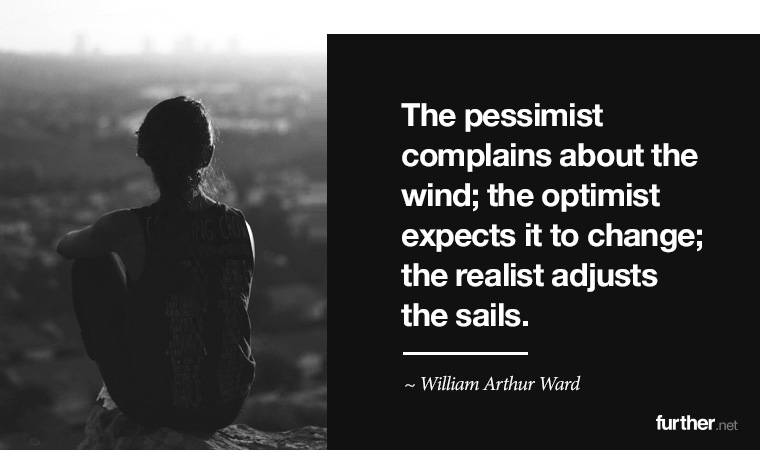
further: feature
Blame silly books like The Secret. Or blame Oprah for promoting silly books like The Secret. Whichever way you go, the result remains the same — spending your time thinking positively about the things you’d like to happen in your life is a waste of time.
That said, how you think is crucial for goal attainment. The way positive thinking is being practiced by many, however, tends to make them less likely to take the action and put in the work to make those dreams come true.
So what works? In her new book Rethinking Positive Thinking: Inside the New Science of Motivation, psychologist Gabriel Oettingen sets forth a four-step process called WOOP:
- Wish: Define your goal – what do you want?
- Outcome: What benefit do you get if you achieve the goal?
- Obstacles: What is it that may hold you back from experiencing that wish and outcome?
- Plan: When the obstacles arise, you’ll then do X to get around them and keep going.
In other words, create a realistic plan of action. It’s okay to be optimistic as long as you’re doing what needs to be done.
Explore the topic more:
- Text: Your Positive Thinking Could Be Holding You Back
- Text: Positive Thinking Doesn’t Work; Here’s What Does
- Audio: Daydreaming and Mental Contrasting for Goal Fulfillment
Oettingen’s book is solid, although I’m only half through it. There are two other books I’ve read that provide you with actionable (if counterintuitive) advice on developing the mindset of those who get things done:
The Antidote: Happiness for People Who Can’t Stand Positive Thinking
- Text and audio: Author interview on NPR’s All Things Considered
- Purchase and reviews: Amazon
The Obstacle is the Way: The Timeless Art of Turning Trials Into Triumph
- Text: Author interview at 800ceoread
- Purchase and reviews: Amazon
I’m positive about one thing – this new research should reduce the number of annoyingly inactive optimists. Well, maybe.
further: health
We’ve heard repeatedly that red wine is good for us … in moderation. And it turns out that although excessive alcohol consumption can cause head and neck cancer, red wine tends to counteract that outcome.
Perhaps the best news for some is that the evidence shows that drinking is good for you, even if you drink a bit more than you should. In fact, people who abstain from alcohol die younger than those who do not. So, you go with that extra eggnog (just don’t spike it with red wine).
Red vino fits in perfectly with the so-called Mediterranean Diet, which has long been cited for its health-promoting benefits. In short, you eat more vegetables, fruits, whole grains and olive oil, and less dairy products and meat. Researchers have new clues as to why it works.
Got a minute? Let’s Work Out: “According to a lovely new study, a single minute of intense exercise, embedded within an otherwise easy 10-minute workout, can improve fitness and health.” See also: 12 Minute Athlete.
further: wealth
Time is money, and the time we spend building what we do is golden. And yet, we often spend the two most productive hours of the day on email and social media. Don’t do that, here’s why. Also, here are some specific productivity tips for entrepreneurs.
On living your best life, embracing failure as learning, and overcoming challenges as the key to happiness: 5 Things Entrepreneurs Know That Other Professionals Don’t (you don’t have to be an entrepreneur to benefit from this advice).
People Make More Money If They’re Emotionally Intelligent: A new study suggests that if you have a good eye for your colleagues’ emotions, you’ll earn more money.
Timely information: 14 smart money moves to make before the end of the year.
further: wisdom
You may be already clued in that online brain exercises offered by sites like Lumosity and BrainHQ are probably useless. More troubling, the advances in neuroscience seem to be the current playground for hucksters and hyperbole, despite all the real value and promise that the research offers. Here are 10 ways that brain myths are harming us.
Here’s some decent brain science – if you’re going to procrastinate, procrastinate well.
How do you eat an elephant? One bite at a time. How do elite athletes gain the slightest advantage? The “aggregation of marginal gains.” Essentially the same as with the elephant, and it can work for you, too.
Naps, meditation, walks in the park – slacking off, right? No, actually the keys to increasing productivity, replenishing attention, solidifying memories, and encouraging creativity. Why Your Brain Needs More Downtime.
__________
That’s it for this week. Maybe tell a friend about further? You know, in the spirit of holiday cheer, seasons greetings, etc. 😉
Keep going-
Brian Clark
Curator-in-Chief
